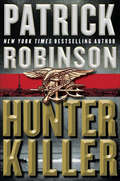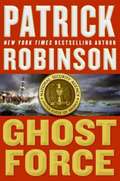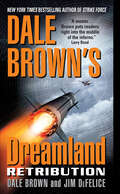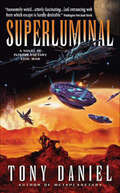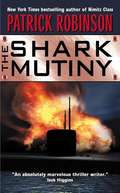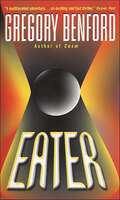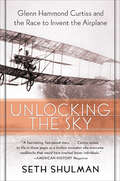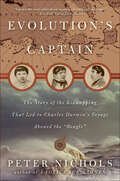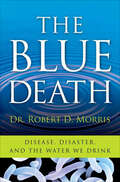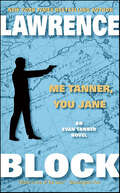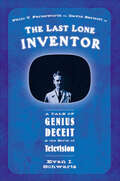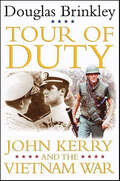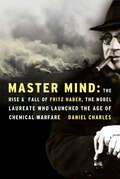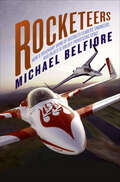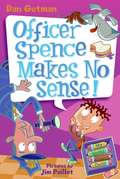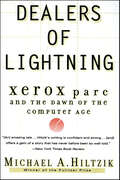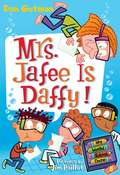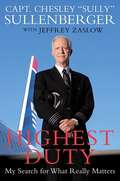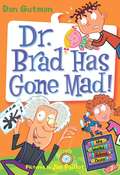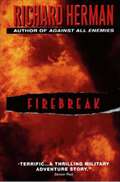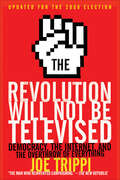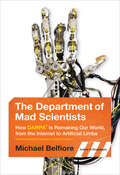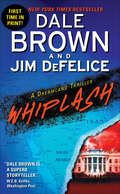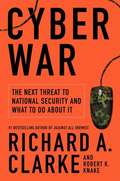- Table View
- List View
Hunter Killer (Arnold Morgan #8)
by Patrick RobinsonAmerican military forces race to prevent a coup in the Middle East in this thriller by the New York Times–bestselling author of Scimitar SL-2.Saudi Arabia, the world’s leading producer of oil, is on the brink of revolution. Inside the opulent palaces and lavish mansions, the royal family is ransacking the country’s dwindling coffers while the desert kingdom seethes with unrest. Appalled at his family’s extravagant lifestyle, Crown Prince Nasir vows to end the careless and destructive rule, and sets in motion a top-secret operation to destroy the Saudi oil industry and bankrupt the monarch. To do so, he must enlist the help of an ally, a naval power willing to help in return for a share of the wealth.Nasir turns to France, with its lethal Hunter Killer submarines, capable of inflicting devastating damage on the massive oil installations along the shores of the Red Sea and in the Persian Gulf. Objective: To shift the power structure of the world’s oil giant.Under the command of the mysterious and lethally effective Colonel Jacques Gamoudi—nicknamed “Le Chasseur,” or “The Hunter—the ferocious battle for the desert kingdom begins. As the world’s oil markets plunge into chaos, United States Admiral Arnold Morgan, former Security Adviser to the President, and Lieutenant Commander Jimmy Ramshawe are summonded to the White House, where they learn that Gamoudi has been joined by none other than Morgan’s archenemy, Hamas General Ravi Rashood, in the battle for the capital city of Riyadh.Now Le Chasseur becomes the hunted, by both French and American Special Forces—one trying to assassinate and silence him forever, the other desperate to take him alive and to force a public confession of France’s subversive actions.Praise for Patrick Robinson“An absolutely marvelous thriller writer.” —Jack Higgins“The new Frederick Forsyth.” —Guardian“Patrick Robinson is quickly replacing Tom Clancy as the preeminent writer of modern naval fiction.” —Florida Times-Union“One of the crown princes of the beach read-thriller.” —Stephen Coonts
Ghost Force (Arnold Morgan #9)
by Patrick RobinsonThe year is 2011. An oil-hungry world is starving . . . . . . and Argentina, with Russia's help, is determined to brutally wrest the petroleum-rich Falkland Islands from British hands. Enraged over this brazen act of international piracy, Great Britain dispatches a battle fleet to the islands for the second time in thirty years--unaware that Viper K-157, a lethal Russian Akula-class submarine, lies in wait, stuffed to the gunwales with ship-killing torpedoes. America cannot sit idle as hell explodes in the South Atlantic and, under the stern eye of Admiral Arnold Morgan, the military's most powerful weapon is unleashed to hammer Argentina into submission: the U.S. Navy SEALs. The outcome of the unforeseen war that's igniting in America's backyard ultimately depends upon her awesome "ghost force" and their successful execution of two remarkable clandestine missions--while the consequences of failure may be too terrible to consider.
Dale Brown's Dreamland: Retribution (Dreamland Thrillers #9)
by Dale Brown Jim DeFeliceThe elite Dreamland team faces their most deangerous mission as terrorists plot a massive nuclear attack on American soil in this military techno-thriller.Dreamland, a top-secret military facility in the Nevada desert, is where high-tech innovations are developed to keep America safe from its enemies. After defusing threats across the globe, the team must now use its stealth, raw nerve, and technology to stop a terror from striking at home. With more than two dozen nuclear devices unaccounted for, the global masters of terror have set a catastrophe in motion: a surprise attack more deadly than Pearl Harbor and 9/11 combined. If the nation is to survive, Lieutenant Colonel Tecumseh “Dog” Bastian and his crew will have to reach deep into their cutting-edge arsenal. And they’ll have to do it short-handed—because two of Dreamland’s best and bravest have been lost at sea.
Superluminal: A Novel of Interplanetary Civil War
by Tony DanielA sci-fantasy with “an awesomely weird yet logical future . . . Utterly fascinating. . . . This is one entrancing web from which escape is hardly desirable.” —Washington Post Book WorldThe future is at war for the soul of humankind . . . It is a time when civilization has extended itself far into the outer reaches of the solar system, and in doing so has developed into something remarkable. But humanity's progeny—the nanotechnological artificial intelligences called “free converts”—face extermination at the hands of the tyrant Amés and his invincible armies, and once the Napoleonesque Director develops superluminal flight, his “Final Solution” will be all but assured.But hope remains alive in the outer system. From the fleeing refugees of a dozen moons and asteroids, General Roger Sherman has amassed an effective and adaptable military force, already forged into a formidable weapon in the fires of battle.However, time is a commodity the courageous Federal Army lacks, as total war erupts between the vast cloudships of the outer system and the deadly armada of the Met, a glorious and terrible conflict that will rage among the stars . . . and within the hearts and minds of every human being.“Spectacular.” —Publishers Weekly“Gripping.” —Booklist
The Shark Mutiny (Arnold Morgan #5)
by Patrick RobinsonAn oil tanker mysteriously explodes in the Persian Gulf. Then a second . . . and a third. To the President's National Security Adviser Admiral Arnold Morgan it is more than a tragic coincidence-it is a brazen act of aggression that must not stand. In partnership with Iran, the Chinese navy has mined the Strait of Hormuz, intending to hold the world's oil supply hostage. Now eighty percent of America's active sea power is being mobilized-including U.S.S. Shark, an aging nuclear submarine on its final tour of duty-to dismantle a deadly alliance between two powerful enemies. But something goes terribly wrong during a bold retaliatory SEAL assault on China's Indian Ocean power plants-a disaster that spawns death, disbelief, rage . . . and rebellion. And with a volatile world on the brink of catastrophic conflict, the commanders of a nuclear boat in the twilight of glory must confront a nightmare as devastating as it is unthinkable: mutiny!
Eater
by Gregory BenfordA scientist facing personal tragedy discovers a sentient black hole targeting humanity in this hard sci-fi thriller from &“a superb storyteller&” (Houston Post). Dr. Benjamin Knowlton&’s private world is crumbling around him. On the threshold of their greatest achievement, the renowned astrophysicist learns that his beloved wife and partner, Channing—an ex-astronaut-turned astronomer—is dying of cancer. Meanwhile, something looms alarmingly on the far edge of the solar system: at once a scientific find of unparalleled importance that could ensure the Knowltons&’ immortality, and a potential earth-shattering cataclysm that dwarfs their private one. For Benjamin and Channing have discovered &“Eater,&” an eons-old black hole anomaly that devours stars and worlds. Yet its most awesome and devasting secrets are still to be revealed . . . and feared.&“A celestial horror tale, a cosmological adventure, a literate end-of-the-world epic, and a story bursting with old-fashioned &‘sense of wonder.&’&” —Orlando Sentinel&“Benford spins poetry from textbook phenomena . . . [His] novel proves that scientific wisdom involves the heart and soul as well as the mind.&” —The Washington Post Book World&“The scientific equivalent of a taut police procedural . . . Benford&’s deft, suspenseful weaving of the struggle between Eater and humanity blends two threads with maximal impact.&” —Newark Star Ledger &“Even in the face of huge events and special effects sequences, Benford manages to keep the characters and the human-scale issues important . . . It&’s just this kind of juggling that characterizes the best of Benford&’s work . . . Eater is Benford&’s most Benfordesque book in quite a while.&” —Locus
Unlocking The Sky: Glenn Hammond Curtiss and the Race to Invent the Airplane
by Seth ShulmanUnlocking the Sky tells the extraordinary tale of the race to design, refine, and manufacture a manned flying machine, a race that took place in the air, on the ground, and in the courtrooms of America. While the Wright brothers threw a veil of secrecy over their flying machine, Glenn Hammond Curtiss -- perhaps the greatest aviator and aeronautical inventor of all time -- freely exchanged information with engineers in America and abroad, resulting in his famous airplane, the June Bug, which made the first ever public flight in America. Fiercely jealous, the Wright brothers took to the courts to keep Curtiss and his airplane out of the sky and off the market. Ultimately, however, it was Curtiss's innovations and designs, not the Wright brothers', that served as the model for the modern airplane.
Evolution's Captain: The Story of the Kidnapping That Led to Charles Darwin's Voyage Aboard the "Beagle"
by Peter NicholsThe story of a visionary but now forgotten English naval officer and the events without which the name Charles Darwin would be unknown to us today.Captain Robert FitzRoy’s first voyage aboard the HMS Beagle had concluded with the kidnapping of four “savages” from Tierra del Fuego. But when his plan to bring them back to England to civilize them as Christian gentlefolk backfired, the second and most famous voyage of the Beagle was born. In naval terms, this second voyage—with twenty-two-year-old Charles Darwin in tow—was a stunning scientific success. But FitzRoy, a fanatical Christian was horrified by the heretical theories Darwin began to develop. As these ideas came to influence the most profound levels of religious and scientific thinking in the nineteenth century, FitzRoy’s knowledge that he had provided Darwin the vehicle for his sacrilegious ideas propelled him irrevocably toward suicide.Praise for Evolution’s Captain“A powerful story played out against a beguiling landscape. . . . Nichols has a finely tuned sense of history.” —New York Times Book Review“A fascinating account. . . . A finely researched, engaging book.” —Atlanta Journal-Constitution“It’ll prove hard not to share [Nichols’s] fascination with how FitzRoy’s naval career inadvertently set off a scientific controversy still flaring to this day.” —Publishers Weekly
The Blue Death: Disease, Disaster, and the Water We Drink
by Robert D. MorrisA public health expert warns about the safety of our water supply and “recounts, with crystal clarity, some of history’s epic drinking water disasters” (Booklist, starred review).A Library Journal Best Consumer Health Book of the YearIn this book, Dr. Robert Morris chronicles the fascinating and at times frightening story of our drinking water. His gripping narrative recounts the epidemics that have shaken cities and nations, the scientists who reached into the invisible and emerged with controversial truths that would save millions of lives, and the economic and political forces that opposed these researchers in a ferocious war of ideas.In the gritty world of nineteenth-century England, amid the ravages of cholera, Morris introduces John Snow, the physician who proved that the deadly disease could be hidden in a drop of water. Decades later in the deserts of Africa, the story follows Louis Pasteur and Robert Koch as they race to find the cause of cholera and a means to prevent its spread. In the twentieth century, burgeoning cities would subdue cholera and typhoid by bending rivers to their will, building massive filtration plants, and bubbling poisonous gas through their drinking water. However, in the new millennium, the demon of waterborne disease is threatening to reemerge, and a growing body of research has linked the chlorine relied on for water treatment with cancer and stillbirths.In The Blue Death, Morris dispels notions of fail-safe water systems and reveals some shocking truths: the millions of miles of leaking water mains, constantly evolving microorganisms, and the looming threat of bioterrorism, which may lead to catastrophe. Across time and around the world, this account offers alarming information about the natural and man-made hazards present in the very water we drink.“While casual readers don’t generally pick up public health books expecting to stay up late turning pages, Morris manages a neat trick—he provides an in-depth medical history that at times reads like a mystery.” —San Francisco Chronicle Book Review“Engrossing and disquieting.” —Publishers Weekly“Morris approaches water systems like an engineers, disease outbreaks like an epidemiologist, and the people and events behind waterborne disasters like an investigative reporter . . . The effect is riveting.” —Kirkus Reviews (starred review)
Me Tanner, You Jane (Evan Tanner)
by Lawrence BlockIt's a jungle out there.Literally. At least for Evan Tanner, eternally sleepless sometime superspy, who finds himself in Africa on the trail of the AWOL ruler of tiny Modonoland. It seems the petty despot's gone missing, and he's taken the state treasury along with him.No stranger to impossible missions and international peril, Tanner's been in over his head before. This time, however, he's in imminent danger of being buried alive. And it all has to do with the CIA, white supremacists, moderate revolutionaries . . . and a blond jungle bombshell named (no joke!) Sheena. Tanner's always been a sucker for a pretty face and a curvaceous body, especially one that's wrapped in leopard skin. But this red hot renegade daughter of a local missionary is a maneater.Which means this time Tanner's goose is well and truly cooked.
The Last Lone Inventor: A Tale of Genius, Deceit, and the Birth of Television
by Evan I. Schwartz“…Fascinating… A riveting American classic of independent brilliance versus corporate arrogance. I found it more fun than fiction.” — James Bradley, author of Flags of Our Fathers“… The fascinating inside story of how this eccentric loner invented television and fought corporate America.” — Walter Isaacson, chariman, CNN“…Compelling…Strong, dramatic prose…” — Kirkus Reviews“…A lively and engaging account.” — Library Journal“[A] gripping and eminently readable saga of the birth of television and the death of the Edisonian myth.” — Darwin magazine
Tour of Duty: John Kerry and the Vietnam War
by Douglas BrinkleyOne of our most acclaimed historians explores the decorated military service of one of America’s most intriguing politicians—the leading Democratic presidential candidate for 2004—and its profound effects on his career and lifeIn Tour of Duty, Brinkley explores Senator John Kerry’s career and deftly deals with such explosive issues as U.S. atrocities in Vietnam and the bombing of Cambodia. Using new information acquired from the recently released Nixon tapes, Brinkley reveals how White House aides Charles Colson and H.R. Haldeman tried to discredit Kerry. Refusing to be intimidated, Kerry started running for public office, eventually becoming a U.S. Senator from Massachusetts. Covering more than four decades, this is the first full-scale definitive account of Kerry’s journey from war to peace. In writing this riveting, action-packed narrative, Brinkley has drawn on extensive interviews with virtually everyone who knew Kerry well in Vietnam. Kerry also relegated to Brinkley his letters home from Vietnam and his voluminous “war notes” journals, notebooks, and personal reminiscences written during and shortly after the war. This material was provided without restriction, to be used at Brinkley’s discretion, and has never before been published.
Master Mind: The Rise & Fall of Fritz Haber, the Nobel Laureate Who Launched the Age of Chemical Warfare
by Daniel Charles“The dramatic life of a German Jewish scientist caught, of his own will, between the promise of science and the annihilation of war.” —Roald Hoffmann, chemist and writerFRITZ HABER—a Nobel laureate in chemistry, a friend of Albert Einstein, a German Jew and World War I hero—may be the most important scientist you have never heard of. The Haber-Bosch process, which he invented at the turn of the twentieth century, revolutionized agriculture by converting nitrogen to fertilizer in quantities massive enough to feed the world. The invention has become an essential pillar for life on earth; some two billion people on our planet could not survive without it. Yet this same process supplied the German military with explosives during World War I, and Haber orchestrated Germany’s use of an entirely new weapon—poison gas. Eventually, Haber’s efforts led to Zyklon B, the gas later used to kill millions—including Haber’s own relatives—in Nazi concentration camps.Master Mind is a thought-provoking biography of this controversial scientist, a modern Faust who personifies the paradox of science, its ability to create and to destroy. It offers a complete chronicle of his tumultuous and ultimately tragic life, from his childhood and rise to prominence in the heady days of the German Empire to his disgrace and exile at the hands of the Nazis; from early decades as the hero who eliminated the threat of starvation to his lingering legacy as a villain whose work led to the demise of millions.“A fascinating tale of science, history, politics, and antisemitism . . . exceptionally compelling reading.” —Deborah Lipstadt, author of Denying the Holocaust
Rocketeers: How a Visionary Band of Business Leaders, Engineers, and Pilots is Boldly Privatizing Space
by Michael Belfiore“That this story is still unfolding makes it especially exciting to read. These men are still in their workshops, tinkering their way into orbit.” —David Gelles, FORBESOn June 21, 2004, SpaceShipOne, built by aircraft designer Burt Rutan, entered space and ushered in the commercial space age. Investment capital began to pour into the new commercial spaceflight industry. Richard Branson’s VirginGalactic plans to ferry space tourists out of the atmosphere. Las Vegas hotelier Robert Bigelow is developing the world’s first commercial space station (i.e., space hotel). These space entrepreneurs, including Microsoft cofounder Paul Allen and Amazon.com founder Jeff Bezos, now see space as the next big thing.In Rocketeers, Michael Belfiore goes behind the scenes of this nascent industry, capturing its wild-west, anything-goes flavor. Likening his research to “hanging out in the Wright brothers’ barn,” Belfiore offers an inspiring and entertaining look at the people who are not afraid to make their bold dreams a reality.“The commercial space race is heating up so fast you need a cheat sheet to keep track of all the billionaires and gamblers vying to be the first private entrepreneur to blast paying customers into orbit. [Belfiore] does a stellar job introducing an intriguing cast of characters.” —Mark Horowitz, Wired“The privatization of space travel is an essential step toward realizing our cosmic destiny. In his engaging, highly readable Rocketeers, Michael Belfiore tells the fascinating story of the entrepreneurs who have already made it happen.” —Buzz Aldrin“A riveting, you-are-there account of how this ragtag collection of innovative thinkers, brave pilots, and bold visionaries is—right now—launching one of the most exciting new industries in history. Belfiore’s eloquent writing and exhaustive reporting really bring this mysterious, secretive world to life.” —Eric Adams, Popular Science
Officer Spence Makes No Sense! (My Weird School Daze #5)
by Dan GutmanThe weirdness never stops! <p><p> The security guard at Ella Mentry School has gone off the deep end! Somebody is stealing peanut butter and jelly sandwiches from the vomitorium, and Officer Spence is on the case. He's arresting everybody in sight! Somebody is going to go to jail! Who is it? You'll have to read the book to find out.
Dealers of Lightning: Xerox PARC and the Dawn of the Computer Age
by Michael A. HiltzikThe Pulitzer Prize-winner’s classic account of the legendary research lab that gave rise to the Digital Age.In the 1970s and ‘80s, Xerox Corporation brought together a brain-trust of engineering geniuses dubbed PARC (Palo Alto Research Center). This brilliant group created several monumental innovations that triggered a technological revolution, including the first personal computer, the laser printer, and the graphical interface (one of the main precursors of the Internet). And when these breakthroughs were rejected by the corporation, these determined inventors turned their ideas into empires that changed the world.Based on extensive interviews with the scientists, engineers, administrators, and executives who lived the story, Dealers of Lightning details PARC’s rise from humble beginnings to a hothouse for ideas. It also shows why Xerox was never able to grasp the cutting-edge innovations PARC delivered. Michael A. Hiltzik offers an unprecedented look at the ideas, the inventions, and the individuals that propelled Xerox PARC to the frontier of techno-history—and the corporate machinations that almost prevented it from achieving greatness.
Mrs. Jafee Is Daffy! (My Weird School Daze #6)
by Dan Gutman Jim PaillotThe weirdness never stops! <p><p> The new vice principal of Ella Mentry School has some crazy ideas on how to teach kids. A.J. and the gang have to stand on their heads while they do math! They have to take a spelling test underwater! Everybody has to do yoga! Could it possibly get any weirder?
Highest Duty: My Search for What Really Matters
by Jeffrey Zaslow Chesley B. SullenbergerIn this inspirational autobiography, Captain "Sully" Sullenberger, the airline pilot whose emergency landing on the Hudson River earned the world's admiration, tells his life story and talks about the essential qualities that he believes have been so vital to his success. In January 2009, the world witnessed one of the most remarkable emergency landings in history when Captain Sullenberger brought a crippled US Airways flight onto the Hudson River, saving the lives of all of the passengers and crew aboard. The successful outcome was the result of effective teamwork, Sully's dedication to airline safety, his belief that a pilot's judgment must go hand-in-hand with-- and can never be replaced by-- technology, and forty years of careful practice and training. From his earliest memories of learning to fly as a teenager in a crop duster's single-engine plane in the skies above rural Texas to his years in the United States Air Force at the controls of a powerful F-4 Phantom, Sully describes the experiences that have helped make him a better leader, particularly the importance of taking responsibility for everyone in his care. And he talks about what he believes is at the heart of America's "can do" spirit: the very human drive to prepare for the unexpected and to meet it with optimism and courage. His wife, Lorrie, has been a pillar of support through all the highs and lows that life has offered, from the challenges of commercial flying to the birth of their two daughters, from financial struggles to the event of January 15, 2009. Though the world may remember Sully as the hero of Flight 1549, the legacy he desires even more is that of a loving husband and father. Highest Duty is the intimate story of a man who has grown up to embrace what we think of as quintessential American values-- leadership, responsibility, commitment to hard work, and service to others. And it is a narrative that reminds us that cultivating seemingly ordinary virtues can prepare us to perform extraordinary acts. 31 pages of photo captions are included at the end.
Dr. Brad Has Gone Mad! (My Weird School Daze #7)
by Dan Gutman Jim PaillotThe weirdness never stops! Ella Mentry School's counselor wants everybody to stop arguing and get along with one another. He wants everybody to be polite! He wants everybody to live in peace and harmony! What is his problem? Now the boys have to play with dolls! The girls have to play with action figures! And that's only the start of Dr. Brad's weird methods. . . .
The Rare and the Beautiful: How the Garman Sisters Captured the Heart of Bohemian London
by Cressida ConnollyLike the better-known Mitfords, the Garman sisters took center stage in Bohemian London during the first half of the twentieth century. Beautiful, flamboyant, and headstrong, they broke away from middle-class conventions, seducing and inspiring a generation of artists. Kathleen, an enigmatic artist's model and aspiring pianist, was the lover and, later, wife of controversial American-born sculptor Jacob Epstein. Mary married the maverick poet Roy Campbell, whose verse attack on the Bloomsbury group following Mary's affair with Vita Sackville-West was the literary scandal of the epoch. Lorna, the youngest and most beautiful of the sisters, was the lover of both the painter Lucian Freud and the poet Laurie Lee.The Rare and the Beautiful offers the first portrait of a beguiling band of eccentric siblings who possessed an uncanny ability to turn heads, break hearts, and spark creative genius. Set against the exciting backdrop of London's decadent subculture, it evokes their extraordinary milieu of high culture, drama, and scandal.
Firebreak
by Richard HermanThe “master of the techno-thriller” moves from the oval office to the frontlines as war erupts in the Middle East in this “fast-paced novel” (Publishers Weekly).In the wake of the Gulf War, a madman still holds the reins of power in Iraq. When his call for a Holy War unites the Arab world against Israel, the resulting combat is certain to have Earth-shattering implications. Israel stands ready to unleash its nuclear arsenal, and it’s up to American President Zack Pontowski to deescalate the situation. As military and geopolitical forces reach a fever pitch, the only chance to avoid Armageddon is to take out Iraq’s chemical weapons arsenal. Pontowski dispatches the 45th Tactical Fighter Wing—a squadron led by his own grandson—to execute the mission.
The Revolution Will Not Be Televised: Democracy, the Internet, and the Overthrow of Everything
by Joe TrippiIn a blend of Wired magazine and The Boys on the Bus, the man who invented Internet politics tells the story of how it was done and reveals how every sector can benefit from tech revolution.Campaign manager Joe Trippi, who signed on to run Howard Dean’s campaign when there was less than $100,000 in the till and fewer than 500 people involved, transformed the most obsure candidate in the field into the Democratic frontrunner and all-but-coronated party nominee in less than a year. The secret of Trippi’s off-the-charts success: a revolutionary use of the Internet, and an impassioned, contagious desire to overthrow politics-as-usual. Before Dean knew it, he had a groundswell of 600,000 Americans behind him, was leading in every poll, and had raised $45 million—more money than any Democrat in history. We now know that unprecedented fundraising, unheard-of numbers of people checking in on the Internet, chatting on blogs, reaching out to their fellow voters and showing up at house parties really can compete with—and in so many ways exceed— the more traditional approaches to winning in politics. But the why’s and how’s leave much fertile ground to plow, and for the first time, Trippi, an icon to all the Dean supporters he energized, is sharing his lessons learned, along with colorful behind-the-scenes stories from the campaign trail. Perhaps lulled by the bust of the dot.com boom, many have dismissed the Internet as old news. But if Dean’s campaign wasn’t enough of a wake-up call, this book is: Trippi reveals just how the sleeping power of technology can be harnessed, and illuminates how every organization and individual in America can benefit from the tidal wave of change on the horizon.
The Department of Mad Scientists: How DARPA Is Remaking Our World, from the Internet to Artificial Limbs
by Michael BelfioreThe first-ever inside look at DARPA—the Defense Advanced Research Projects Agency—the maverick and controversial group whose futuristic work has had amazing civilian and military applications, from the Internet to GPS to driverless cars America's greatest idea factory isn't Bell Labs, Silicon Valley, or MIT's Media Lab. It's the secretive, Pentagon-led agency known as DARPA. Founded by Eisenhower in response to Sputnik and the Soviet space program, DARPA mixes military officers with sneaker-wearing scientists, seeking paradigm-shifting ideas in varied fields—from energy, robotics, and rockets to peopleless operating rooms, driverless cars, and planes that can fly halfway around the world in just hours. DARPA gave birth to the Internet, GPS, and mind-controlled robotic arms. Its geniuses define future technology for the military and the rest of us.Michael Belfiore was given unprecedented access to write this first-ever popular account of DARPA. Visiting research sites across the country, he watched scientists in action and talked to the creative, fearlessly ambitious visionaries working for and with DARPA. Much of DARPA's work is classified, and this book is full of material that has barely been reported in the general media. In fact, DARPA estimates that only 2 percent of Americans know much of anything about the agency. This fascinating read demonstrates that DARPA isn't so much frightening as it is inspiring—it is our future.
Whiplash: Whiplash (Dreamland Thrillers #11)
by Dale Brown Jim DeFeliceA high-tech covert strike force takes aim at a nuclear armed extremist in the New York Times–bestselling co-author’s military techno-thriller.The world is watching as the U.S. and Iran agree to lay down their swords. But one man hiding in Africa holds the power to obliterate the peace. Shrouded by the bloody madness of tribal warfare, Iranian functionary-turned-fanatic Bani Aberhadji has created a vast network dedicated to unleashing a nuclear nightmare. Only by chance are American agents now learning of its existence . . . and it may already be too late.The covert strike force Whiplash is armed and ready to spring into action. Born from the ashes of Dreamland, it possesses the most cutting-edge military technology on Earth. But Aberhadji’s web of death is wide and well concealed . . . and the doomsday clock is ticking.
Cyber War: The Next Threat to National Security and What to Do About It
by Richard A. Clarke Robert KnakeRichard A. Clarke warned America once before about the havoc terrorism would wreak on our national security--and he was right. Now he warns us of another threat, silent but equally dangerous. Cyber War is a powerful book about technology, government, and military strategy; about criminals, spies, soldiers, and hackers. This is the first book about the war of the future--cyber war--and a convincing argument that we may already be in peril of losing it. Cyber War goes behind the "geek talk" of hackers and computer scientists to explain clearly and convincingly what cyber war is, how cyber weapons work, and how vulnerable we are as a nation and as individuals to the vast and looming web of cyber criminals. From the first cyber crisis meeting in the White House a decade ago to the boardrooms of Silicon Valley and the electrical tunnels under Manhattan, Clarke and coauthor Robert K. Knake trace the rise of the cyber age and profile the unlikely characters and places at the epicenter of the battlefield. They recount the foreign cyber spies who hacked into the office of the Secretary of Defense, the control systems for U.S. electric power grids, and the plans to protect America's latest fighter aircraft. Economically and militarily, Clarke and Knake argue, what we've already lost in the new millennium's cyber battles is tantamount to the Soviet and Chinese theft of our nuclear bomb secrets in the 1940s and 1950s. The possibilities of what we stand to lose in an all-out cyber war--our individual and national security among them-- are just as chilling. Powerful and convincing, Cyber War begins the critical debate about the next great threat to national security.
